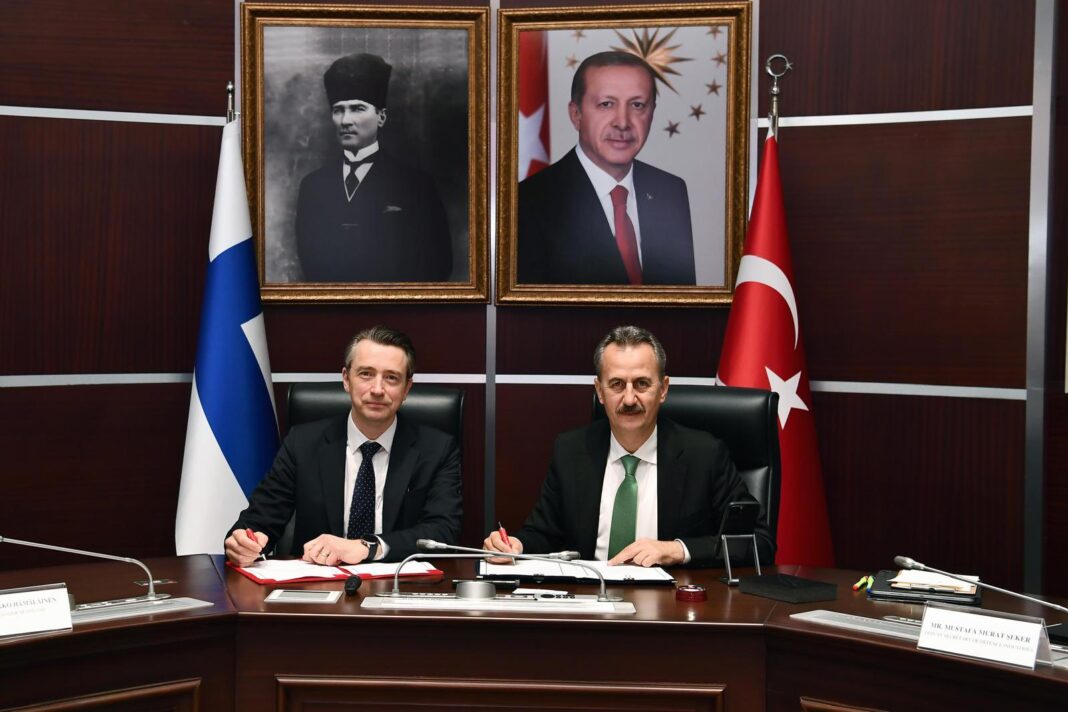Turkey and Finland signed a Defense Industry Cooperation Memorandum of Understanding (MoU) on Monday, aimed at improving defense cooperation between the two NATO allies through joint production, technology sharing and capability development, Turkish authorities announced on X.
The agreement was signed by Secretary of Turkey’s Defense Industry Agency (SSB) Haluk Görgün and Finland’s Director General for Resource Policy and National Armaments Director Olli Ruutu.
Relations between the two nations had been strained by a Finnish arms embargo on Turkey between 2019 and 2023, imposed in response to Turkey’s Operation Peace Spring in northeastern Syria — a military incursion aimed at removing Kurdish forces from border areas.
Tensions began to ease in early 2023 when Finland lifted its military export restrictions and issued its first defense export license to Turkey since 2019. The move was part of a broader strategic bargain: In exchange for removing the embargo, Finland gained Turkey’s approval for its NATO membership — ratified by Turkey’s parliament in March 2023.
By authorizing key defense exports, including 12,000 tons of armor-grade steel to Turkish company BMC and establishing clearer arms transfer protocols, Finland helped normalize relations.
Görgün pointed out the broader strategic implications of the partnership in his X account statement: “This cooperation, which will strengthen NATO’s deterrence, is also an important step toward the integration of Europe’s defense industry.”
The MoU signals more than just improved bilateral relations: It is a calculated effort to bolster NATO’s northern and southeastern flanks. Finland brings Arctic warfare expertise and advanced manufacturing capabilities, while Turkey contributes its strengths in unmanned systems, missile technologies and battlefield-tested defense platforms.
Under the agreement Finnish defense firm Patria, which reported €1.26 billion in new orders in 2024, up 33 percent from 2023, will collaborate with Turkish companies such as ASELSAN and Roketsan on joint production.
One key initiative involves integrating ASELSAN’s remote-controlled weapon systems into Finnish defense company Patria’s 6×6 and 8×8 armored vehicles, with an eye toward export to markets in South America and the Middle East.
Finland’s defense exports reached a 20-year high in 2023 at €333 million. The country has emerged as one of NATO’s top defense spenders, allocating 2.5 percent of its gross domestic product (GDP) to defense in 2025 — well above the alliance’s 2 percent benchmark. The 2025 budget includes €1.9 billion ($2.07 billion) for F-35A fighter jets and €156 million ($170 million) for NATO interoperability initiatives.
Turkey, meanwhile, continues to broaden its presence in global defense markets, leveraging long-standing relationships in Central Asia, the Middle East and Africa. Turkish companies are poised to benefit from access to European and Nordic markets through collaboration with Finnish industry leaders.
In line with its expanding defense footprint, Finnish military export licenses reached €667 million in 2023. Key destinations included Sweden (€51 million), Latvia (€34 million) and Lithuania (€19 million).
Notably, 40–60 percent of Finland’s defense production is exported, particularly in communications systems, armored vehicles and Arctic warfare technology.
The agreement also supports the European Union’s defense integration agenda by reducing dependence on non-European suppliers.
While export coordination and supply chain logistics remain areas of complexity, market access presents both an opportunity and a challenge. Turkish firms stand to gain from Finnish expertise in reaching European and Nordic markets, while Finnish companies can tap into Turkey’s established networks in the Middle East, Central Asia and Africa.

